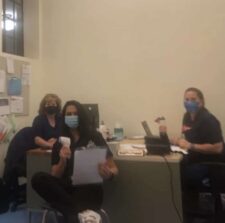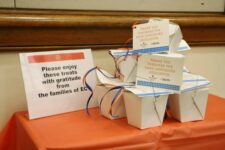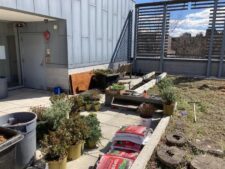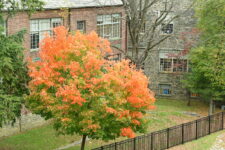In the summer leading up to the 2020–2021 academic year, faculty and staff at the Ethical Culture Fieldston School worked through three different contingencies for how school might look: fully on campus, fully remote, or hyflex. While ECFS leadership sifted through changing safety protocols from New York City and New York State, the School remained devoted to providing ECFS’s trademark progressive education.
By mid-August, guidance finally crystallized, and ECFS chose a hyflex model — one that included a mix of on-campus classes of student pods and remote learning. ECFS faced a new challenge: Many faculty members would not be able to be on campus due to medical accommodations necessary in the COVID-19 pandemic, and students would need adults in the room. Thus began a massive hiring undertaking, with “a lot of sleepless nights and weekends,” says Yolanda Dublin, Assistant Director, Human Resources. “It was a lot of last-minute brainstorming to pull this off.”
In less than a month, the Human Resources Office hired roughly 120 proctors who would serve as the on-campus counterparts to teachers leading their classes remotely. Proctors had to have excellent communication skills and experience with children, as well as a willingness to be on campus.
Over this academic year, ECFS’s proctors have proven themselves to be absolutely invaluable. As the eyes, ears, and helping hands of remote teachers in the classroom, proctors are critical to maintaining the flow of classes and safety of students — and must adapt to changing conditions like teacher and pod quarantines.
It took the efforts of so many in the community from the Nursing Team, Campus Safety, Facilities, and our faculty and proctors to get to this point in the academic year. “We would not have made it through this year without proctors,” Dublin says. “We wouldn’t have opened and we wouldn’t have stayed open,” adds Katerina Lucas, Assistant Director, Human Resources, and “the proctors have been a godsend to our community,” says Rashad Randolph, Fieldston Upper Assistant Principal for Student Life.
Here, proctors from our four divisions join a roundtable discussion about their experiences at ECFS in this unique year.
What’s a regular day like for you?
Tyler Fields, Fieldston Middle Proctor: I’ve been paired with 6th Grade Art all year with an occasional cameo in 8th Grade Science and a week in Fieldston Upper when Fieldston Middle was fully remote. As a proctor, I am 25% substitute teacher, 75% child wrangler. My days start at 5:00am when I log my health status on the Magnus Health app. Once I get to campus, I pick up the infamous art cart from the art room, which is stocked with various supplies for our classes. I have 1–3 classes in the mornings, and then my afternoons are filled with study halls.
You have to go in every day with a “yes attitude” and be ready for anything that’s being thrown at you.
Mariel Taveras, Fieldston Upper and Fieldston Middle Proctor: I have had the opportunity to proctor for teachers across Fieldston Middle and Fieldston Upper for all subjects. Just recently, in one week, I covered History, Mandarin, P.E., and Math. For the most part, a regular day for a proctor is unpredictable. You have to go in every day with a “yes attitude” and be ready for anything that’s being thrown at you. A paired proctor has a set schedule, which is always nice, but many times, last-minute classes are assigned, and you have to be able to navigate through the challenges you may come across.
Moises Belizario, Fieldston Lower Proctor: I am a proctor for the 4th and 5th Grade pods. I enjoy greeting the students in the morning, assisting with classwork, and creating an engaging, safe, and cheerful environment for the students. There is never a dull moment at Fieldston Lower. Be it substituting for the associate teachers and head teachers, taking the students to PE classes, or helping with COVId-19 tests, there is always a lot to do!
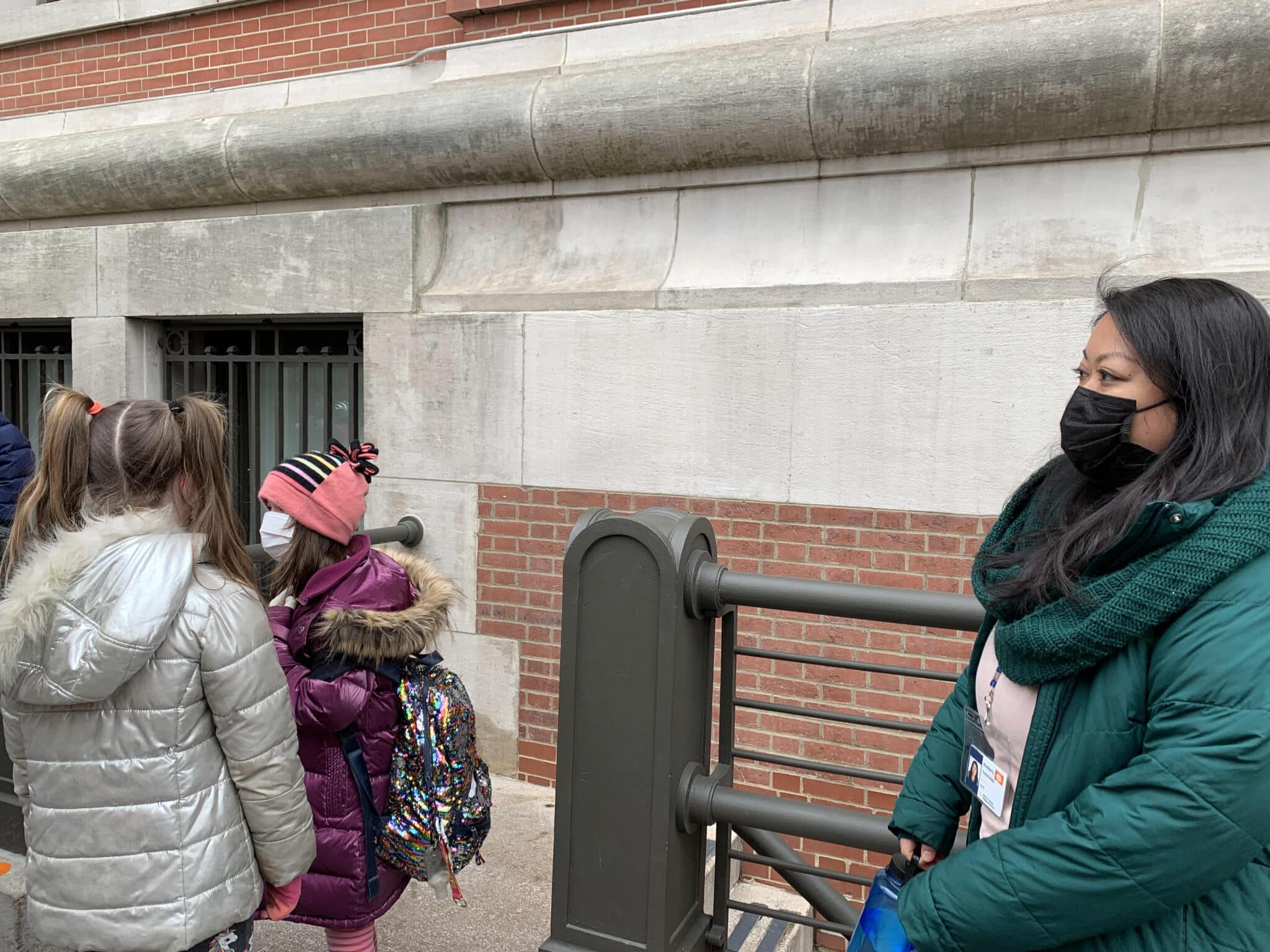
Kimberly Conchada, Ethical Culture Proctor: Every day is different! I mostly help facilitate class time during students’ specials classes, which include Ethics, Science, Art, Music, and Spanish. These, of course, are held virtually this year, so I am the students’ physical support and contact, while their specials teachers are there virtually to teach their lesson. I also help the class by setting up snack and lunch break, and oversee their P.E. class, whether it is outside or virtual. A core part of my job is keeping students safe on campus as administration and faculty navigate the unique circumstances of the pandemic.
What are some of the challenges of working as a proctor?
Fields: Being a proctor involves a lot of troubleshooting, patience, and Olympic-level flexibility. The beginning of the year was very interesting as we all were figuring out what was going on. Over time, my biggest challenge has been trying to stay ahead of issues and ready to solve them in multiple ways. Also, trying to help my remote teacher understand what I’m dealing with in the room and me understanding what they are dealing with remotely and finding fixes jointly.
Being a proctor involves a lot of troubleshooting, patience, and Olympic-level flexibility.
Conchada: As anyone can imagine, nine-year-olds have tons of energy and funny personalities as they are at an interesting age in their intellectual and social development, so most of the challenges around being a proctor have been related to the dynamic of learning and socializing while abiding by COVID-19 safety protocols. It has been a rough last 12 months for everyone, but it’s been especially hard when we can’t exactly “let kids be kids.”
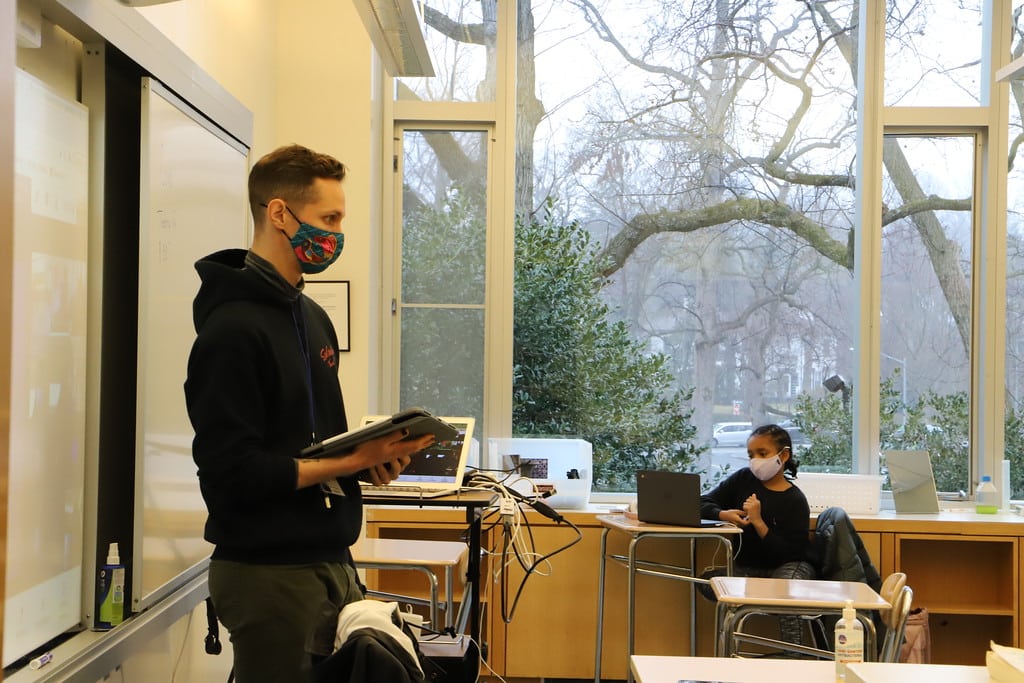
How do you connect with the ECFS community?
Belizario: I think the head teachers — and here, the senior staff — are just amazing. Conversations always happen — student conversations — during breaks, and I just think this is such an amazing campus. I’m blown away. I’ve been around here for the last 20 years, and I never knew of this campus, and now that I’m on it, I think it’s a well-kept secret. This is an amazing place.
Taveras: Since I am a crossover proctor, I have had the opportunity and privilege of engaging with both Fieldston Middle and Fieldston Upper students. I think during these times, it’s really important to remind ourselves to be compassionate. It’s been a rough year for everyone, and I truly believe the pandemic has humbled all of us. With that being said, I believe the students and faculty are more grateful than ever to be here, to simply be amongst each other and be able to connect in person.
Conchada: I feel grateful to have found such a compassionate and inclusive group of educators and staff who share similar values of progressive education.
What’s your favorite part of your job?
Fields: The biggest perk has definitely been getting vaccinated! So grateful for that.
Taveras: If I’m honest, I think at the beginning I undervalued being a proctor. But now I feel otherwise: We’re part of something bigger. Our position has allowed the School to remain open and to continue operating in person, making it highly rewarding at the end of the day.
Conchada: My favorite part is the kids, of course! I have worked in education and with children for years before and in different capacities, so being reintroduced to this work has been humbling, but also very fun and hilarious. The students are all so different, so smart, and sweet in their own ways — there is nothing like that energy of being around kids every day!
Belizario: The other day, I was walking around the School, saying to myself: I’m in the fortunate position. I get to work with both 4th Grade classes and both 5th Grade classes. I think that’s an amazing experience.
